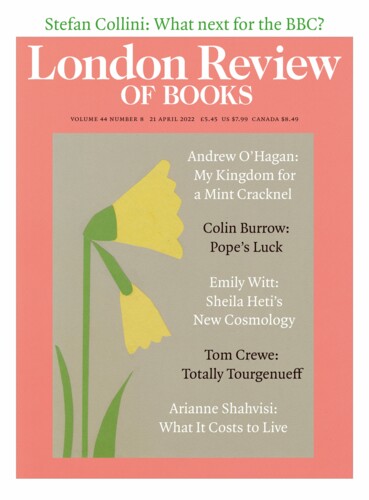One doctor who has worked in Manston told the Today programme of inadequate washing facilities in the ‘horrible and crowded conditions’. The chief inspector of borders and immigration said last week that the conditions he had seen on a visit had left him ‘speechless’. According to the Refugee Council, one boy contracted scabies – caused by parasitic mites – after a nineteen-day stay. A video taken by the campaign group SOAS Detainee Support on Sunday, 30 October showed children chanting: ‘We need your help.’
Liam Shaw
Liam Shaw is a Wellcome-funded research fellow at the MacLean Lab in Oxford, researching bacterial genetics. He is writing a book about the history of antibiotics.
The UK health secretary, Thérèse Coffey, has announced her intention to make it easier for people in England to get antibiotics. The plans are still vague, but involve patients being able to get some antibiotics directly from pharmacists without a GP prescription. Pharmacists in Scotland have for several years now been able to prescribe antibiotics for uncomplicated urinary tract infections (UTIs). Based on this data, the Department of Health and Social Care believe that such a move in England could save 400,000 GP appointments a year.
In Hogarth’s An Election Entertainment, depicting the 1754 Oxfordshire by-election, a placard lies on the floor: ‘Give us our Eleven Days’. The slogan refers to the adoption of the Calendar (New Style) Act, which caused eleven days in September 1752 to be removed from the calendar. The idea that there were actual riots over the erasure bobs up like a historical beachball no matter how often it is punctured. It’s all too easy to imagine people taking to the streets in outrage at the bureaucratic theft of time. UK universities were invited to begin their submissions to REF2021 in February 2020.
Life Soup: Slime!
Liam Shaw, 21 April 2022
Afew hours after Jean-Paul Sartre was injected with mescaline by his friend Daniel Lagache, a psychiatrist at the Sainte-Anne Hospital in Paris, Simone de Beauvoir phoned to check in on the first-time tripper. Her call came as a reprieve. As Sartre told her in a scrambled voice, she had interrupted a losing battle against a mass of octopuses. He had been promised a safe experience. An...
We have an eyewitness account of the 1646 eruption in the form of a letter from the governor of Tenerife, Alonso de Yclan y Valdès, to the king of Spain. I consulted the copy in the British Library; it was almost like reading the news.
Read anywhere with the London Review of Books app, available now from the App Store for Apple devices, Google Play for Android devices and Amazon for your Kindle Fire.
Sign up to our newsletter
For highlights from the latest issue, our archive and the blog, as well as news, events and exclusive promotions.


